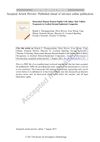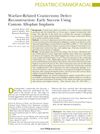 126 citations,
February 2017 in “JAMA Surgery”
126 citations,
February 2017 in “JAMA Surgery” Surgeons must understand the full care process for gender confirmation surgery to help transgender individuals effectively.
 119 citations,
March 2020 in “Frontiers in Bioengineering and Biotechnology”
119 citations,
March 2020 in “Frontiers in Bioengineering and Biotechnology” Asia has made significant progress in tissue engineering and regenerative medicine, but wider clinical use requires more development.
 109 citations,
April 2000 in “European Urology”
109 citations,
April 2000 in “European Urology” Finasteride lowers risk of urinary issues and surgery by over 50% in 4 years.
 100 citations,
May 2011 in “Journal of Pediatric and Adolescent Gynecology”
100 citations,
May 2011 in “Journal of Pediatric and Adolescent Gynecology” The document concludes that proper diagnosis and a multidisciplinary approach are crucial for managing Congenital Adrenal Hyperplasia effectively.
 83 citations,
January 2015 in “World Journal of Stem Cells”
83 citations,
January 2015 in “World Journal of Stem Cells” Hair follicle regeneration needs special conditions and young cells.
 77 citations,
April 1999 in “Dermatologic Clinics”
77 citations,
April 1999 in “Dermatologic Clinics” The document concludes that follicular unit transplantation offers more natural results and better graft survival than older hair transplant methods.
 75 citations,
January 2011 in “Plastic and Reconstructive Surgery”
75 citations,
January 2011 in “Plastic and Reconstructive Surgery” The dermal regeneration template is effective in skin regeneration, reducing scarring, and has potential for future improvements.
 73 citations,
January 1997 in “British Journal of Ophthalmology”
73 citations,
January 1997 in “British Journal of Ophthalmology” The coronal approach is effective and safe for reducing eye bulging in Graves' eye disease.
 71 citations,
February 2020 in “Journal of Translational Medicine”
71 citations,
February 2020 in “Journal of Translational Medicine” Progress has been made in skin and nerve regeneration, but more research is needed to improve methods and ensure safety.
 70 citations,
February 2021 in “International Journal of Molecular Sciences”
70 citations,
February 2021 in “International Journal of Molecular Sciences” Fat-derived stem cells, platelet-rich plasma, and biomaterials show promise for healing chronic skin wounds and improving soft tissue with few side effects.
 69 citations,
June 2017 in “Experimental Biology and Medicine”
69 citations,
June 2017 in “Experimental Biology and Medicine” Advanced human skin models improve drug development and could replace animal testing.
 69 citations,
September 1991 in “Journal of Surgical Research”
69 citations,
September 1991 in “Journal of Surgical Research” Understanding how fetal wounds heal could help improve healing in adults.
 66 citations,
June 2015 in “Aesthetic Plastic Surgery”
66 citations,
June 2015 in “Aesthetic Plastic Surgery” Platelet preparations generally show positive effects on wound healing and facial rejuvenation, but more thorough research is needed to confirm their effectiveness.
 65 citations,
September 1998 in “Eye”
65 citations,
September 1998 in “Eye” Orbital decompression surgery for Graves' orbitopathy caused double vision in 19% of patients, with similar rates for two surgical methods.
 57 citations,
November 1987 in “Pediatric Dermatology”
57 citations,
November 1987 in “Pediatric Dermatology” Children's hair grows in different types from before birth through puberty, with growth rates and characteristics varying by age, sex, and race.
 55 citations,
June 2013 in “Dermatologic Surgery”
55 citations,
June 2013 in “Dermatologic Surgery” Ablative fractional resurfacing could improve how well topical drugs penetrate the skin, but more research is needed to fine-tune the method.
 55 citations,
October 2009 in “Clinics in Plastic Surgery”
55 citations,
October 2009 in “Clinics in Plastic Surgery” Burn reconstruction improves with new techniques, materials, and tissue engineering.
 55 citations,
October 2003 in “Dermatologic Clinics”
55 citations,
October 2003 in “Dermatologic Clinics” Different hair care practices and conditions affect African American hair and scalp health, requiring specialized knowledge for treatment.
 51 citations,
August 2013 in “Journal of Investigative Dermatology”
51 citations,
August 2013 in “Journal of Investigative Dermatology” Human skin cells can create new hair follicles when transplanted into mice.
 48 citations,
December 2004 in “Differentiation”
48 citations,
December 2004 in “Differentiation” Tooth papilla cells can help regenerate hair follicles and grow hair.
 47 citations,
July 2013 in “Pharmacological Reviews”
47 citations,
July 2013 in “Pharmacological Reviews” Regenerative pharmacology, which combines drugs with regenerative medicine, shows promise for repairing damaged body parts and needs more interdisciplinary research.
 43 citations,
December 2013 in “Stem Cells”
43 citations,
December 2013 in “Stem Cells” Stretching skin increases a certain protein that attracts stem cells, helping skin regeneration.
 41 citations,
September 2014 in “JAMA Facial Plastic Surgery”
41 citations,
September 2014 in “JAMA Facial Plastic Surgery” Use finasteride, minoxidil, and follicular unit transplantation for hair loss treatment.
 39 citations,
October 2018 in “Aesthetic surgery journal”
39 citations,
October 2018 in “Aesthetic surgery journal” Injectables can feminize or masculinize a transgender person's face, but more research is needed for best practices.
 39 citations,
April 2018 in “Hormones”
39 citations,
April 2018 in “Hormones” No consistent link between genotype and phenotype in 5-α-Reductase type 2 deficiency.
 39 citations,
August 2005 in “Dermatologic surgery”
39 citations,
August 2005 in “Dermatologic surgery” Micropigmentation is a widely accepted tattooing technique for hiding cosmetic issues and medical uses, with permanent results and few side effects, but risks infection if not done with sterile tools.
 38 citations,
February 2016 in “Surgery Journal”
38 citations,
February 2016 in “Surgery Journal” Facial plastic surgery has evolved to focus on less invasive techniques and innovative technologies for cosmetic and reconstructive procedures.
 35 citations,
January 2014 in “Journal of Tissue Engineering”
35 citations,
January 2014 in “Journal of Tissue Engineering” Cell-based therapies using dermal papilla cells and adipocyte lineage cells show potential for hair regeneration.
 34 citations,
February 2018 in “Drug Design Development and Therapy”
34 citations,
February 2018 in “Drug Design Development and Therapy” Bimatoprost is safe and effective for improving eyebrow hair.
 34 citations,
March 2011 in “Plastic and Reconstructive Surgery”
34 citations,
March 2011 in “Plastic and Reconstructive Surgery” Custom-designed implants effectively repaired skull damage in most soldiers injured in combat.






























